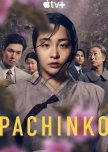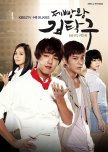
This review may contain spoilers
The book and the drama are two different things
For anyone who has not read the book, I recommend reading it before watching this series. I watched the first two episodes before reading the book and found it hard to understand the storyline or get involved with the characters. The book provided the background and emotional bond I needed to watch the rest of the episodes.The drama adaptation is different in spirit from the book. The book is written through the lens of Zainichi Koreans who shared their experiences with the author; resilient people who overcame all obstacles and carved a life for themselves in their adopted country. They call it home. Reading the book gave me a feeling of vaguely disturbing, uncomfortable familiarity. This was my family's story, expressing things that I had never heard expressed before. It made me feel that our experience was part of a bigger whole, not unique or isolated.
The drama didn't give me those feelings. The book is an impartial account of both the good and the bad. Not so the drama. Parts of the book that express sympathy for or attachment to Japan are left out. Details of what Koreans suffered have been added in. Yet the fact that Koreans were persecuted for their Christian faith is obscured. There is a suggestion that Isak was arrested for involvement with Communists, instead of being arrested because he refused to bow at the shrine.
Instead of portraying the Korean people as the strong, resilient, resourceful survivors that they are, the drama seems more interested in portraying them all as victims. Such a depiction does the Koreans a great disservice. They deserve more. They survived and thrived in situations that would have made the Japanese curl up and die in discouragement.
Hansu is turned into a sympathetic character, with an entire episode dedicated to him with material that is not in the book, portraying him as a victim of circumstances. The book gives no excuses for his behavior, but the drama makes sure we understand that he became what he was because of Japan and the Japanese. Even Hana is turned into a victim; Solomon gets blamed (or blames himself) for her going bad because he had to go away to avoid the consequences of a Korean getting into trouble in Japan. In the book, it is she who went away for her own reasons and broke his heart. It was her deliberate choice to pursue the life she led.
Unfortunately, the people who adapted the book skewed the story to fit their own perception of the world. Taken on its own, without the book, the drama wouldn't be so bad. However, the story is so choppy that I was unable to follow it without the background knowledge of the book.
The fake Kansai accents and the noticeably Korean accented Japanese spoken by people who have supposedly lived in Japan all their lives, is a minor quibble. At least their Japanese is better than in the book. The "Soo nee" sprinkled liberally throughout the book shows that the author had little understanding of when and how to use the phrase.
It was worth watching, but I would not watch it again. I will probably not watch the future installments.
Was this review helpful to you?

This review may contain spoilers
The most amusing bread in the world
This drama has many typical makjang elements, but the story sucked me in with its heartbreak, secrets and courage in face of all odds. It's ten years old, but it is still the 30th highest rated Korean drama of all time.While the show features lots of delicious looking bread and dough preparation, it's evident the writer knew nothing whatsoever about bread. Having baked bread since I was 8 years old, I find the world of breadmaking portrayed here unrealistic and comical. It is not necessary or particularly helpful to have a good sense of smell when making bread. Nor does it take years and years to master the art, especially in a commercial bakery with professional equipment. However, perhaps it would take years in that particular bakery because the teacher is never once shown actually teaching anyone how to make bread. The apprentices seem to be left to flounder and scrape along on their own with no guidance. After years of working there they don't even have the least idea how to make sourdough, for goodness' sake.
Definitely watch this show for the family drama and character development, not the baking.
Was this review helpful to you?



